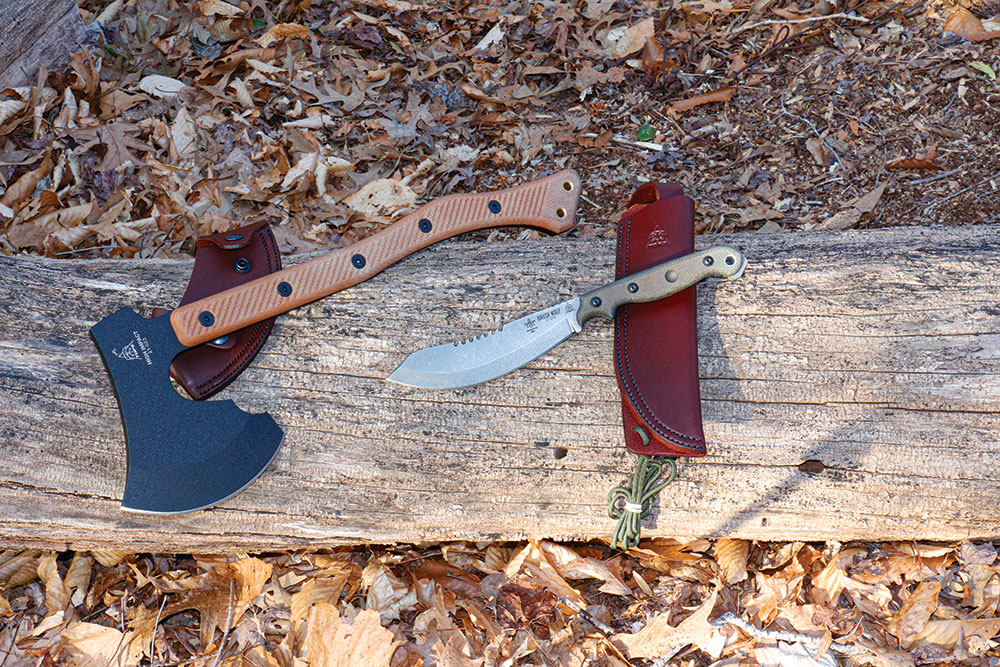TOPS High Impact and Brush Wolf pick up where the other leaves off.
They’re new, high-quality takes on a couple of the most basic, most necessary tools for backwoods living.
I’ve come to expect nothing less than rugged construction and excellent design from the TOPS brand, and the company’s High Impact axe and Brush Wolf fixed-blade knife deliver on both counts. These are a couple of heavy hitters in the TOPS lineup of new blades, and it seems natural to review them together, because they complement each other very nicely.
Rather than packing one mammoth knife that’s only a moderate chopper and a bit clunky for precise work, I’ve always favored a hatchet or midsized axe for chopping and a midsized knife for more-intricate cutting tasks. Add a folding saw and a smaller knife to this duo, and you can accomplish just about any campsite mission.
HIGH IMPACT
How do you size up the High Impact? It could be considered one brute of a beefy hatchet or a svelte, midsized axe.
Call it what you like, I’m calling this design by TOPS President Leo Espinoza awesome. The High Impact measures 20 inches long overall. It’s constructed of 1075 high-carbon steel that’s 3/8 inch thick and protected by a black Traction coating. That’s one piece of steel from top to bottom—perhaps the largest full-tang model on the market! The edge is an ample 5.75 inches and excels at making the wood chips fly.
“How do you size up the High Impact? It could be considered one brute of a beefy hatchet or a svelte, midsized axe.”
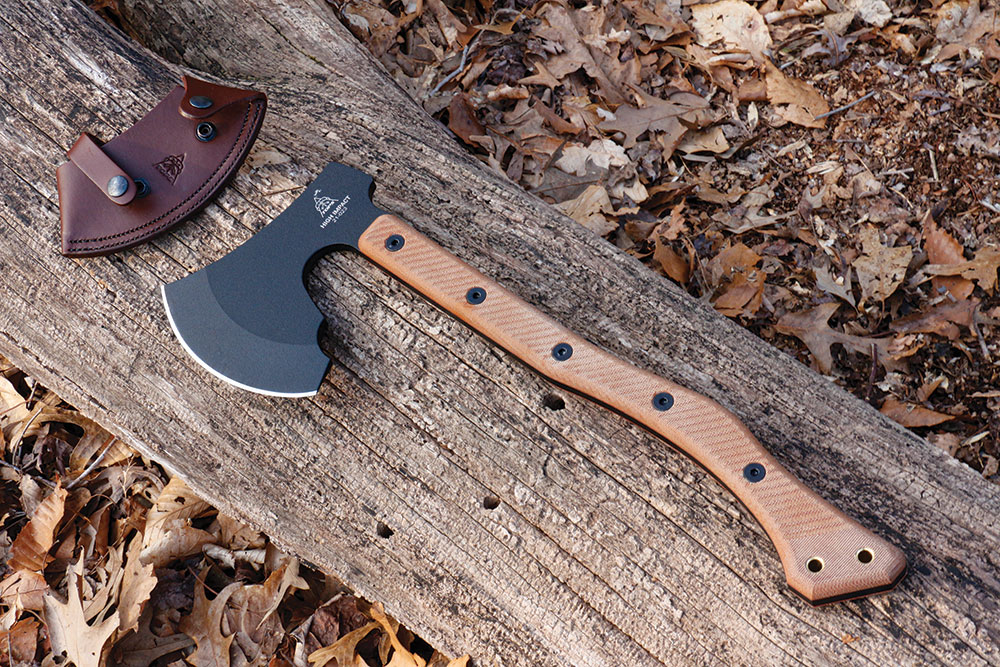
At 58.8 ounces (61.6 with the included leather sheath), it’s no light weight. It is, frankly, a bit more axe than I’m used to packing. It’s bigger and heavier than the typical hatchets or tomahawks I own. Yet, the super-compact “pack axes”—the ones on the market with the abbreviated, little handles—are always the ones I leave behind, because, from my perspective, they just don’t provide enough leverage to make them worth carrying.
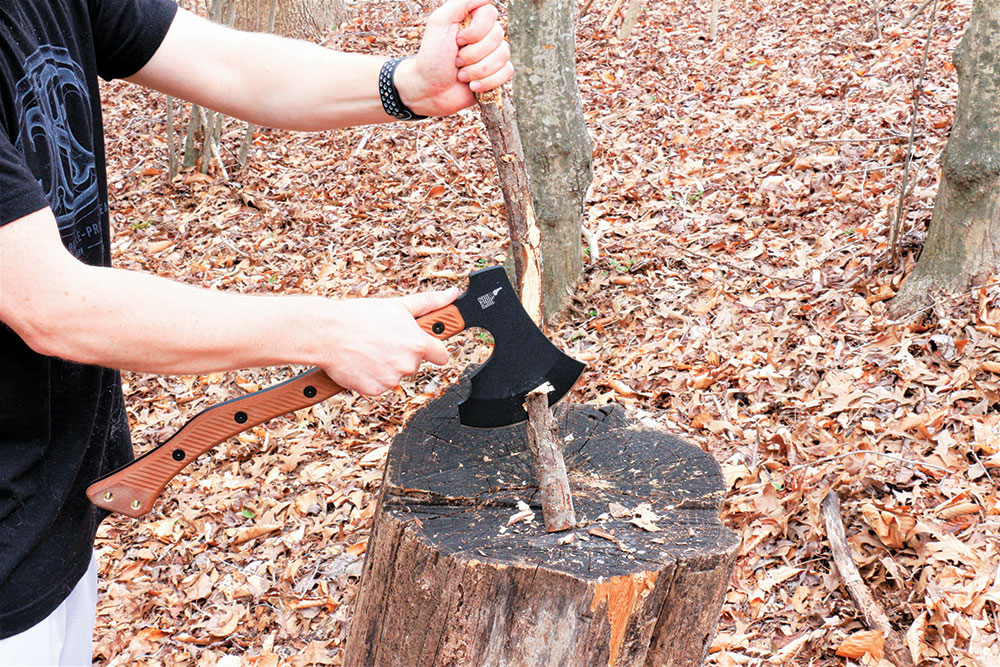
While obviously not as long as a full-sized axe, the High Impact offers a decent, two-handed swing. Its full tang is covered with tan canvas Micarta grip panels. They’re grippy enough without causing irritation. That’s good, because you can’t get much work done if your hands are covered in blisters. And, I found the curves in the handle to be situated in the right places to make the chopping strokes very efficient. If you need to ease back on the power, the edge has enough beard so that precise cuts are a breeze when you choke up on the handle and use the High Impact with one hand.
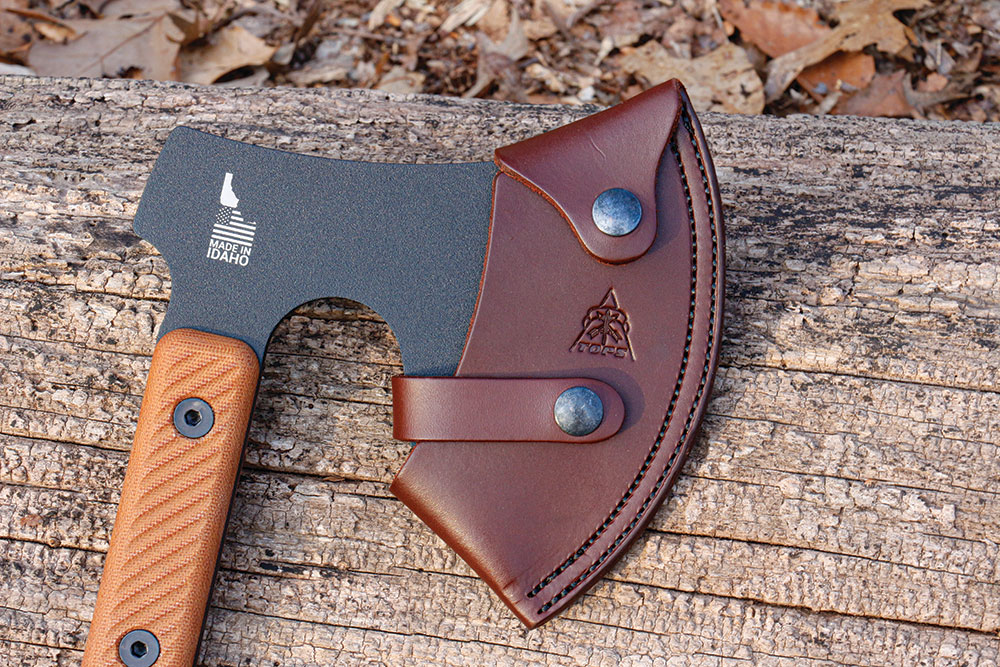
No, I probably wouldn’t choose the High Impact for a weekend backpacking trip during which I’m covering miles and need to travel light. However, if I’m establishing a remote camp, it’s a tool I’d want to have on hand. It would be especially useful for maintaining a ready supply of right-sized chunks of firewood for cooking and warmth on cold nights. In addition, an effective chopping tool would enable me to improvise things through woodcraft that would help me create a more comfortable camp.
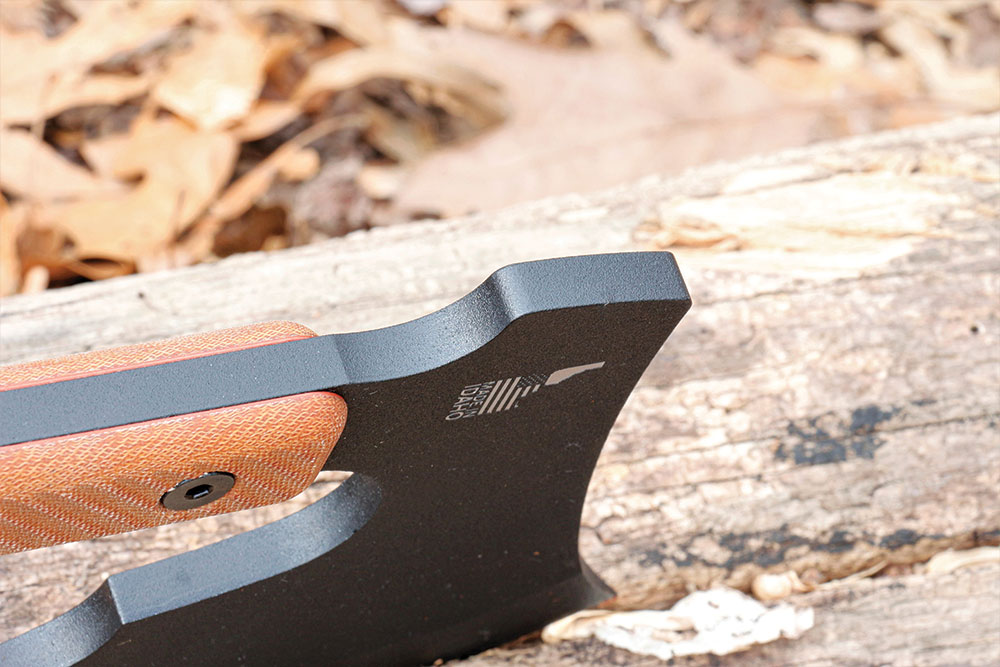
I found this axe well suited to splitting firewood into kindling. Cutting poles to erect a shelter with a tarp also would be easy work for this tool. I’ve often wedged or tied a pole between two trees and staked out a rubberized poncho over the top of it as a makeshift A-frame. This keeps the poncho tauter than if I merely strung it over a line.
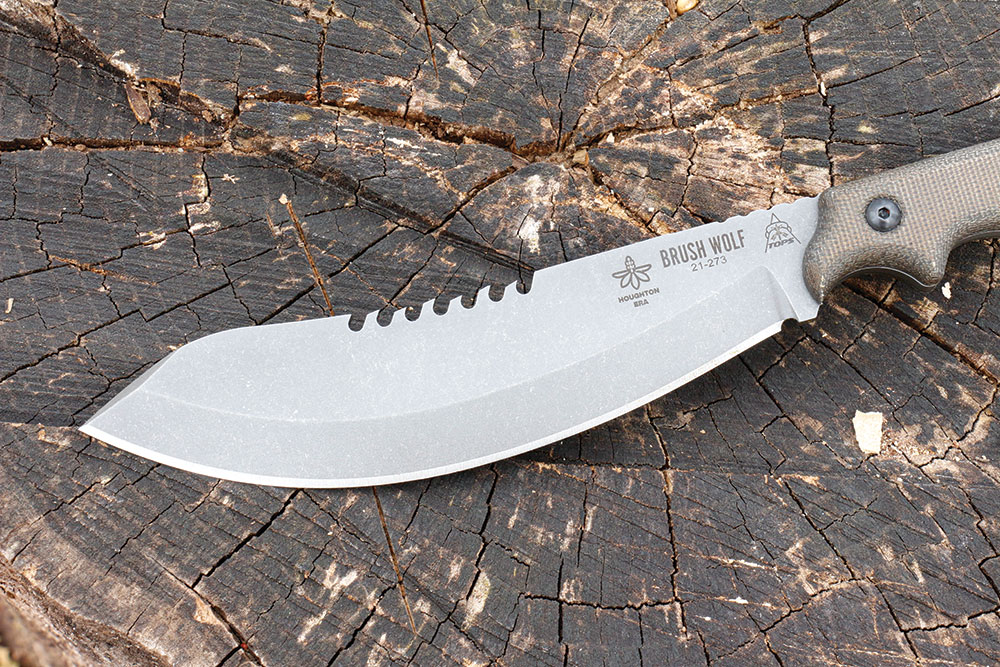
What the axe doesn’t have is a wide hammer poll on the back of the head. You could still use it to pound tent stakes, but it’s not as wide as the poll on some other midsized axes. In order to incorporate that, you’d have to make it a much heavier tool.
The High Impact comes with a very sharp edge. This isn’t a tool you’ll need to sharpen (or possibly ruin) with a file. Whenever necessary, I’d use something such as the Lansky Dual Grit Puck Sharpener to fine-tune the edge.
And finally, the axe’s fine leather sheath snaps over the edge and adds a degree of safety when strapping the axe to the side of a pack.
TOPS High Impact Axe
Specifications
- Overall length: 20.0 inches
- Blade length: 5.75 inches
- Cutting edge: 5.75 inches
- Blade thickness: 0.38 inch
- Blade steel: 1075 (RC 56-58)
- Blade finish: Black Traction coating
- Handle material: Tan canvas Micarta
- Weight, axe: 58.8 ounces
- Weight with sheath: 61.6 ounces
- Sheath: Brown leather
- Designer: Leo Espinoza
MSRP: $360
BRUSH WOLF
The TOPS Brush Wolf, designed by brothers Aaron and Nate Morgan of Houghton Era Outdoors, is a versatile, fixed-blade knife that serves well alone or when paired with the High Impact. Don’t mistake its name with its purpose: It’s not designed as a dedicated blade to hack through underbrush (although you could use it to clear shooting lanes or to shear small pine boughs to pad an emergency shelter).
“The TOPS Brush Wolf is a versatile fixed-blade knife that serves well alone or when paired with the High Impact.”
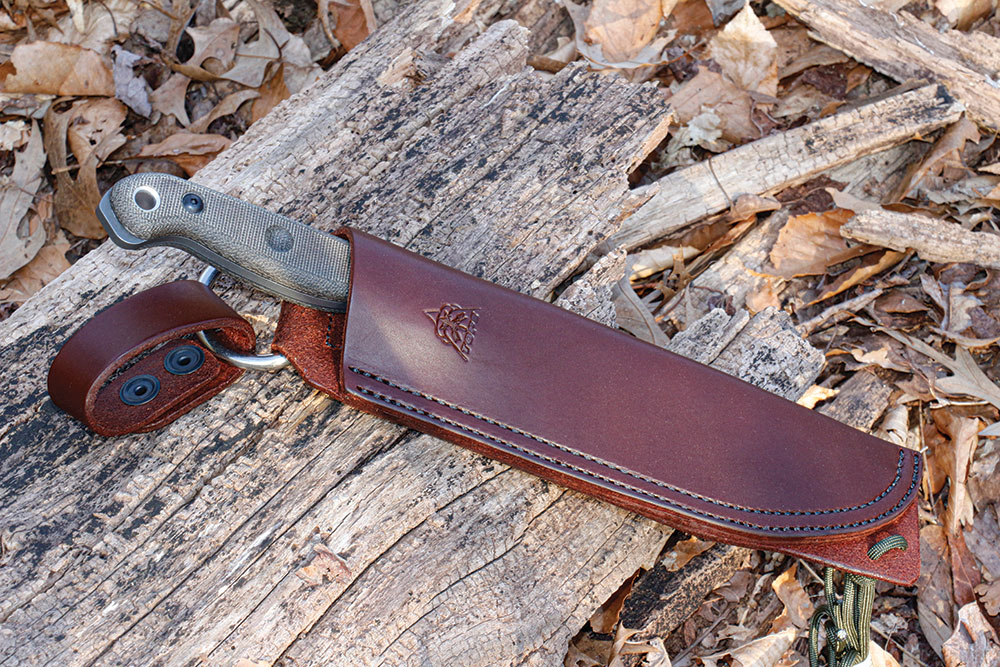
Actually, the Brush Wolf is named for the trickster himself—the far-ranging, resourceful coyote. However, the Brush Wolf is a wily coyote with lots of capability and isn’t to be confused with the hapless “Wile E. Coyote” of cartoon fame and misfortune.
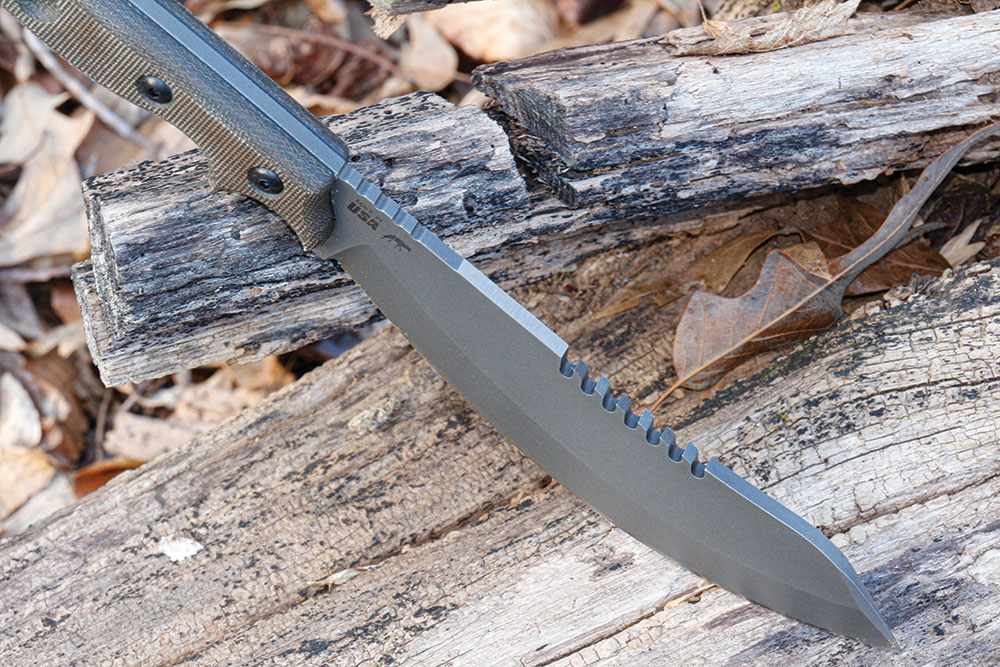
The Brush Wolf borrows heavily from the Nessmuk, one of the traditional-styled, bushcraft blade shapes. That shape features a blade with lots of belly that sweeps up to meet the tip that drops at an acute angle from the spine. (“Nessmuk” was the pen name of George Washington Sears, who wrote for Forest and Stream magazine in the late 1800s. He was known for taking solo canoe-camping and ultralight backpacking trips. He favored a kit that included a double-bit axe, a midsized, fixed-blade knife and a two-bladed, slip-joint, folding, moose-patterned knife with spear and clip blades. That’s a pretty good set of tools for the backwoods!)
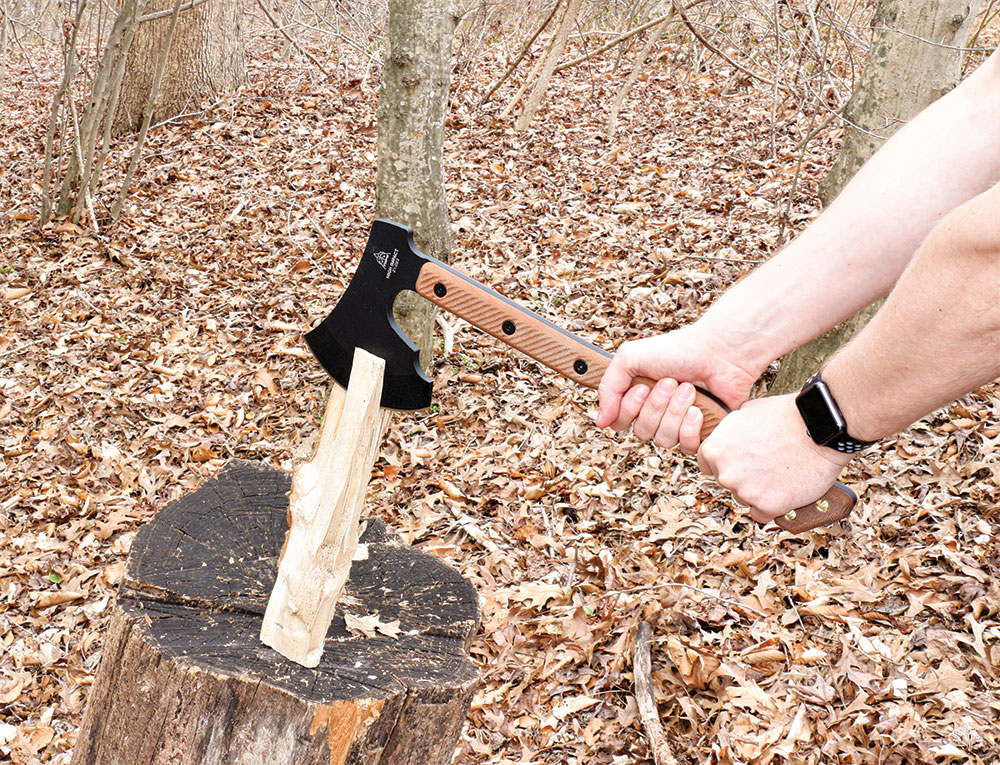
The Brush Wolf features full-tang construction of 1095 high-carbon steel with a subdued, gray acid rain finish. It’s 12.13 inches overall. The blade, which features a high saber grind, has a cutting edge of 6.25 inches and is a sturdy 0.19 inch thick.
“I’ve come to expect nothing less than rugged construction and excellent design from the TOPS brand, and the company’s High Impact axe and Brush Wolf fixed-blade knife deliver on both counts.”
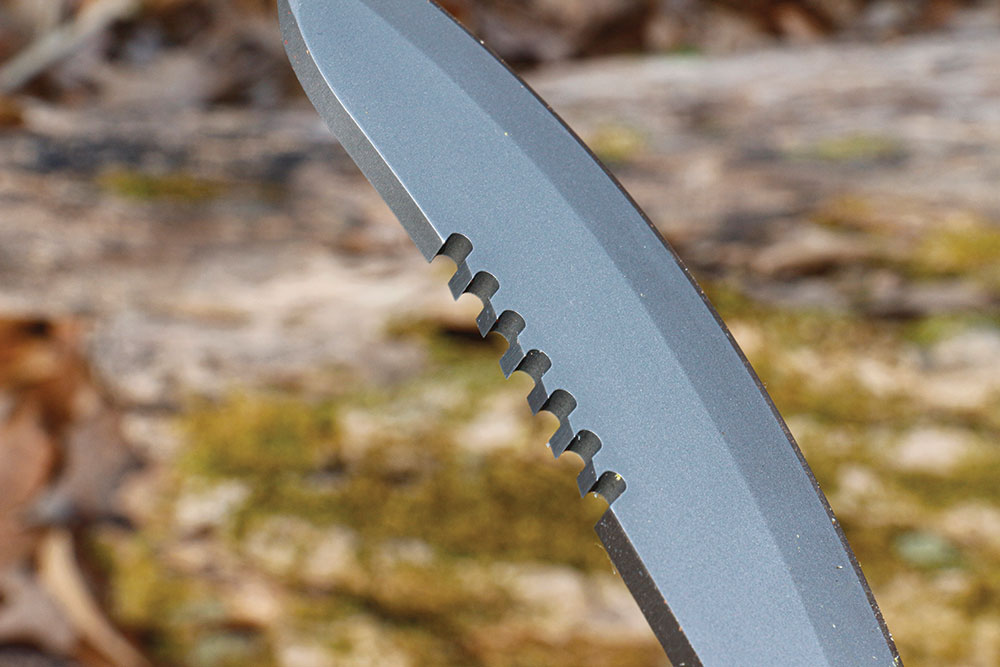
The Brush Wolf’s large belly would make it a very good blade for skinning and food prep, but it’s not shaped for lots of penetration. If stabbing is part of your strategy—say, if you wanted a knife you could form into a lance or if self-defense weighs more heavily in your knife’s requirements—you’ll have to make a different choice. While the Brush Wolf’s tip isn’t long, the unsharpened swedge on the back side provides a bit more pointiness for boring holes in wood or hides.
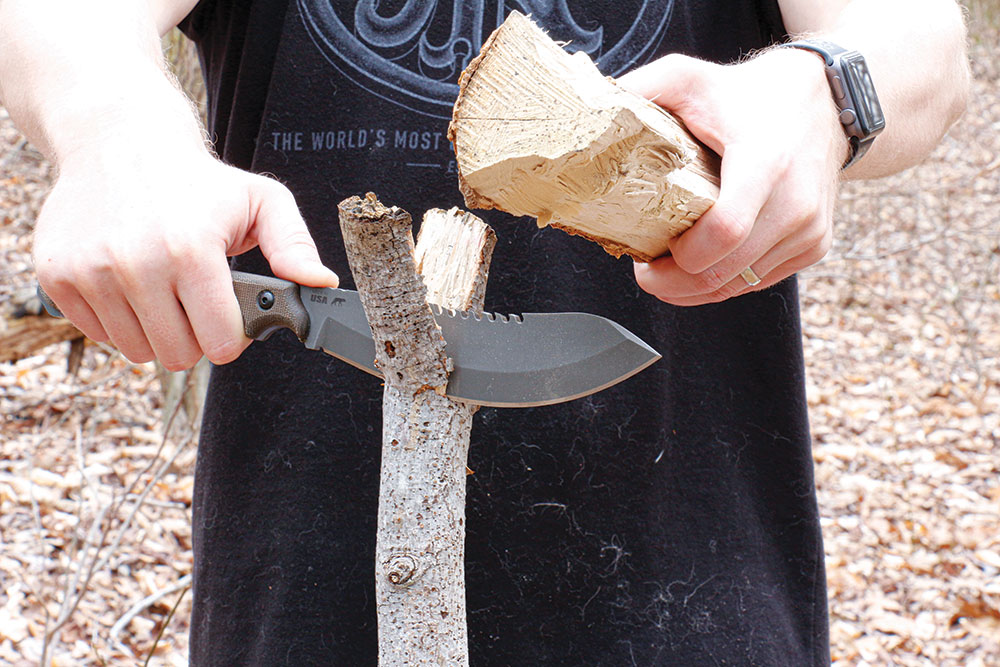
The blade’s spine features some jimping where you’d place your thumb for detail work. There’s also a short, bare steel section with distinct 90-degree edges that’s perfect for scraping a ferro rod or prepping tinder for a fire. Beyond that, there’s a section of large saw teeth on the spine. These won’t give you a fine, clean cut, and they’re not intended as a replacement for a regular wood saw, but they’re perfect if you need to notch wood for stakes, trap triggers and stop-cuts for other projects. The sawing capability would be handy for making dovetail notches too—an often overlooked way of attaching pieces of wood without cordage.
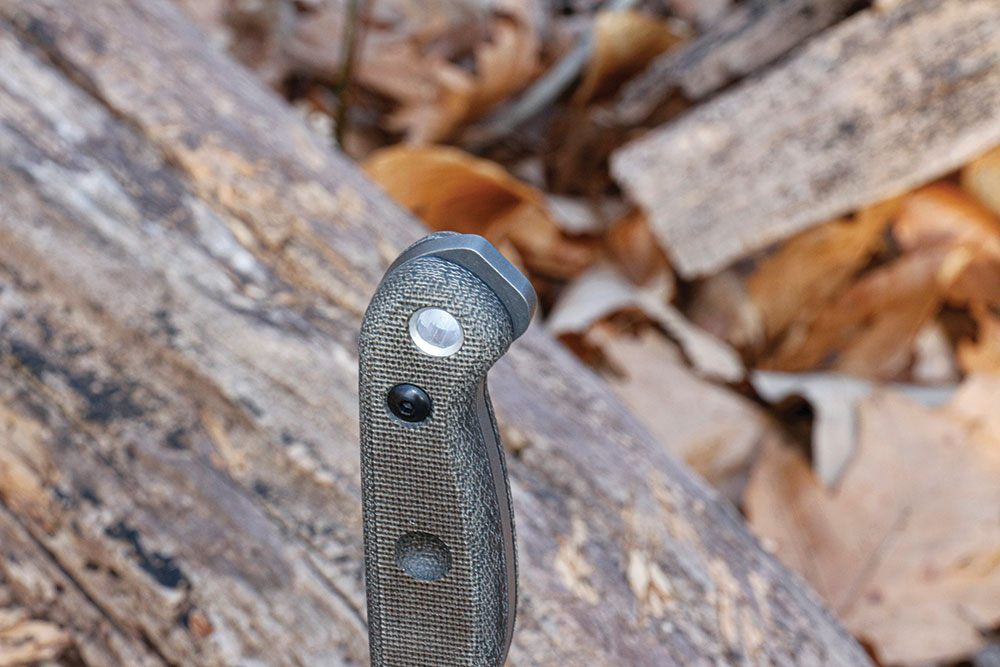
The Brush Wolf’s handle is one of its best features. It features green Micarta handle scales with a bow drill divot on each side to aid in primitive friction fire-starting. The length of the handle is excellent. My hands aren’t especially large, but I appreciate this handle, which measures 5½ inches long. That gives me plenty of options for how I grip the knife: far back for chopping leverage; the middle for general-purpose cuts; and up close to the blade, using the finger groove for the index finger when making controlled, precise cuts. The tang extends beyond the end of the grip panels to provide some light pounding capability.
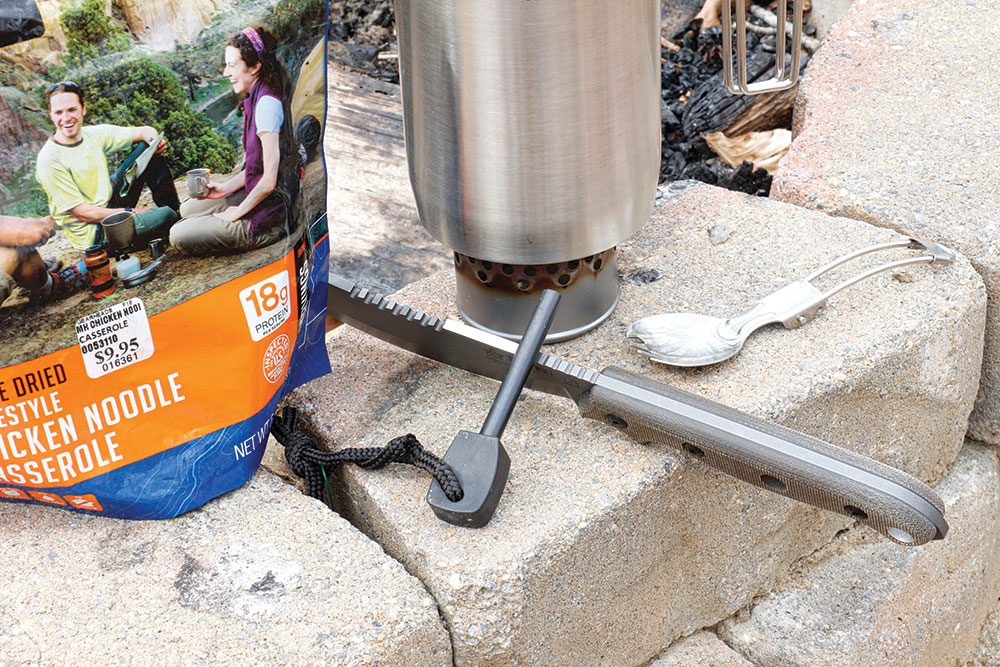
Thankfully, the lanyard hole is large enough for some actual paracord, not just flimsy kite string, as with some lanyard holes. A lanyard can come in handy as extra security—tying the knife in its sheath to your belt—when fording a river or when traveling by canoe. Nevertheless, please don’t wrap a lanyard around your wrist when using any knife. If you lose your grip, the knife will swing right back at you. You can, however, loop a lanyard over the top of the handle so that the lanyard forms two loops below the handle for your fingers.
“The Brush Wolf features full-tang construction of 1095 high-carbon steel with a subdued, gray, acid rain finish. It’s 12.13 inches overall. The blade, which features a high saber grind, has a cutting edge of 6.25 inches and is a sturdy 0.19 inch thick.”
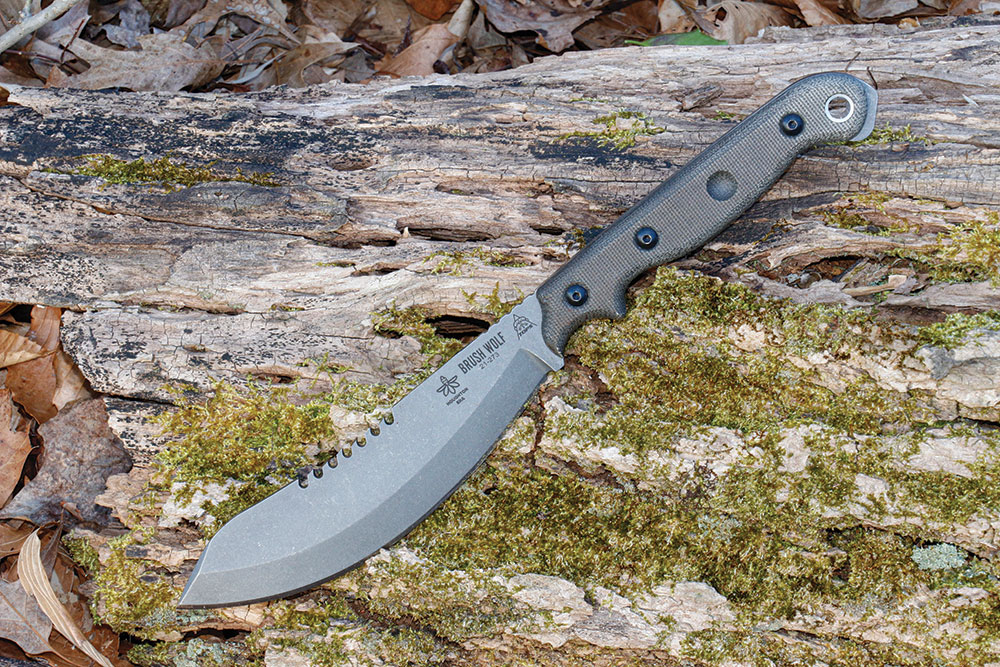
The leather sheath that comes with the Brush Wolf is excellent. It holds the knife deeply within it. There’s a dangler at the top consisting of a steel ring and leather straps, enabling you to reposition the knife when you’re seated. These straps have snap closures so you can take the knife on or off your belt without getting half naked ( … and afraid of losing your pants). A length of paracord at the bottom of the sheath can be tied around your thigh to keep the sheath from swinging as you move. Or, you can untie that paracord and use it to form a lanyard.
TOPS Brush Wolf Knife
Specifications
- Overall length: 12.13 inches
- Blade length: 6.5 inches
- Cutting edge: 6.25 inches
- Blade thickness: 0.19 inch
- Blade steel: 1095 (RC 56-58)
- Blade finish: Gray acid rain
- Handle material: Green canvas Micarta
- Weight, knife: 11.7 ounces
- Weight with sheath: 17.7 ounces
- Sheath: Brown leather
- Designers: Nate and Aaron Morgan
MSRP: $230
SETTING OTHERS ASIDE
I have to admit that I have a fondness for TOPS knives. I’m always tempted to buy another Skinat, which is one of my favorite TOPS models (I already have two). TOPS’ Baja 3.0 and Wolf Pup are a couple of my favorite small fixed blades.
“Now, after working with the High Impact and Brush Wolf, I’ll be setting aside some very good hatchets and fixed blades from other very good companies.”
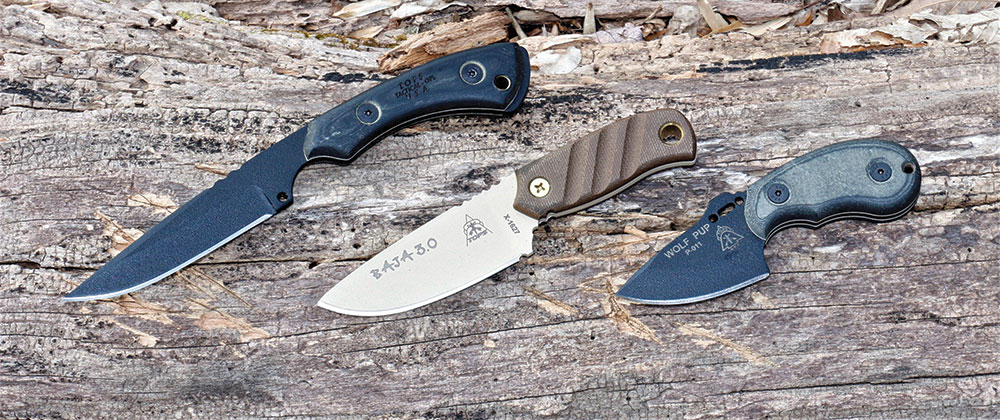
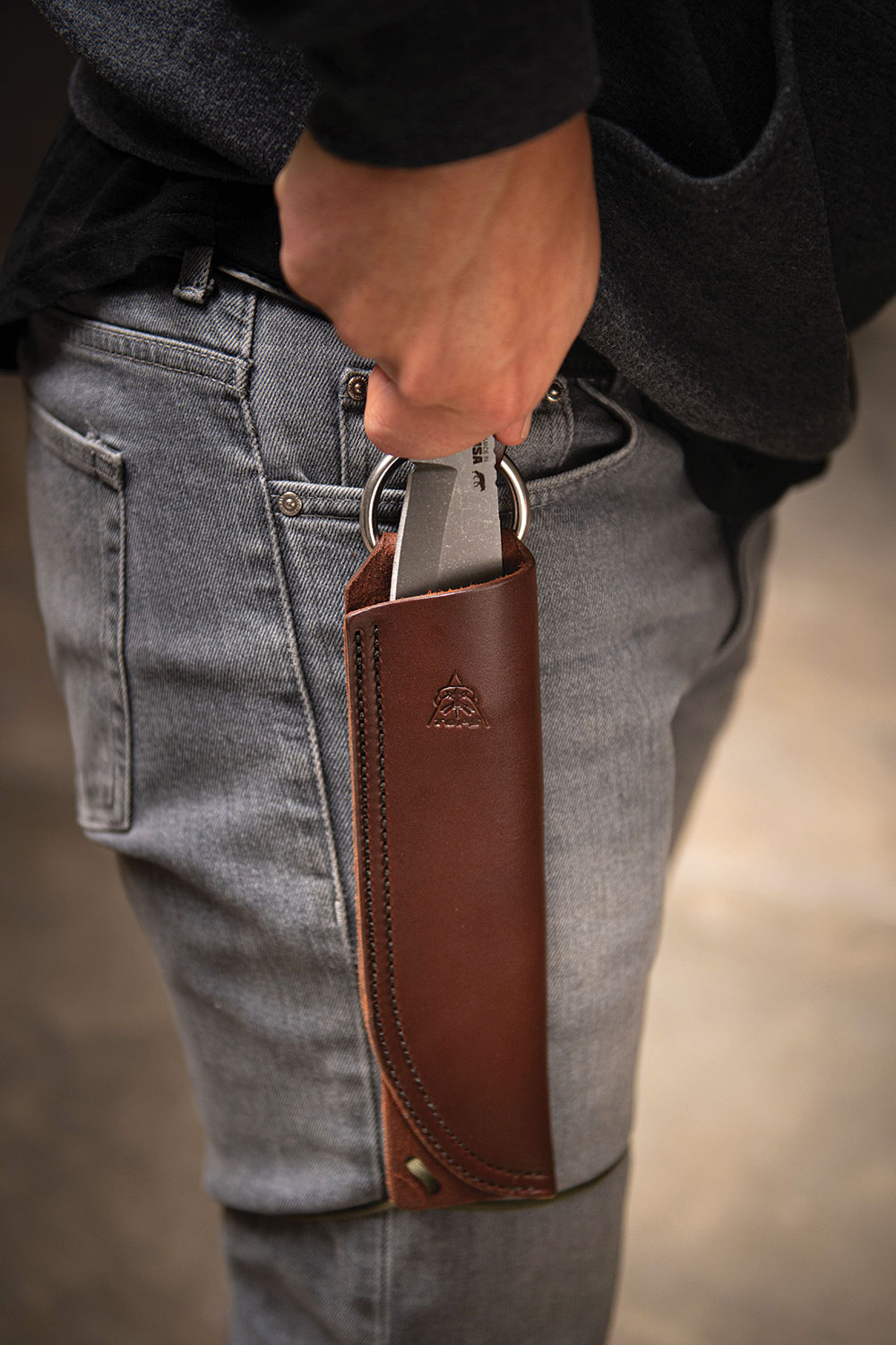
At times, the company seems to be reading my mind whenever I contemplate the blades I’d like to own. Now, after working with the High Impact and Brush Wolf, I’ll be setting aside some very good hatchets and fixed blades from other very good companies. I’m moving the High Impact and Brush Wolf to the head of the line. I’ll be apt to choose them over several other models for my outdoor adventures that lie ahead. (I’d also bet that old Nessmuk, himself, would approve.)
TOPS: Mission Accomplished
It seems as if TOPS Knives has been around forever, but it’s been just 23 years.
When TOPS was founded in 1998, its mission was to offer overbuilt, hard-use tools for professionals—those in the military, special police units and outdoor rescue teams. The input for the company’s designs came from those folks.
Along the way, these rugged blades caught on with many outdoor adventurers who were looking at these knives more with an eye toward survival and bushcraft. Today, TOPS Knives, located in Idaho, has a wide following among those who appreciate rugged, fixed-blade knives.
SOURCES
Lansky Sharpeners
(716) 877-7511
Lansky.com
TOPS Knives
(208) 542-0113
TOPSKnives.com
A version of this article first appeared in the August 2021 print issue of American Outdoor Guide.


